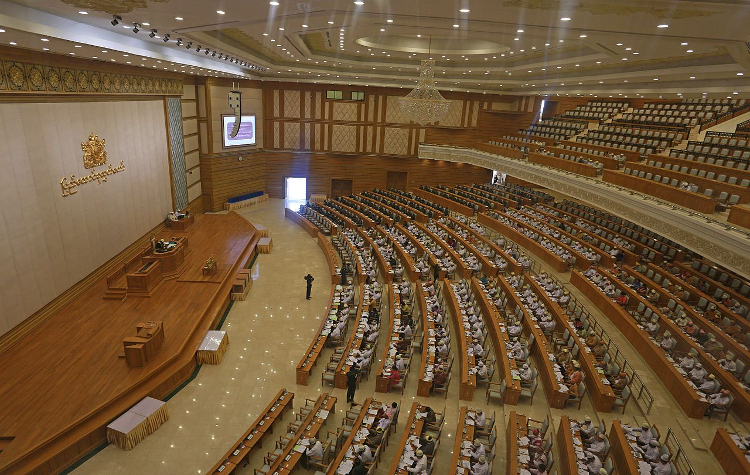(Bangkok, 21 March 2018) The Asian Forum for Human Rights and Development (FORUM-ASIA) and its member, Equality Myanmar are gravely concerned by the approval of the proposed amendments to the 2011 Peaceful Assembly and Peaceful Procession Law by the House of Nationalities (Upper House) on 7 March 2018.[1] The amended bill has been sent to the House of Representatives (Lower House) where it is expected to be discussed this week. These new amendments are highly restrictive of the rights to freedom of peaceful assembly and association, freedom of expression, and democracy in Myanmar.
The amendments, which were originally submitted on 19 February 2018 by the Upper House Bill Committee, present several contentious changes to the law, which further restrict freedoms and liberties which they are supposed to protect and promote. According to the amended Article 4[2], a notification letter has to be submitted to the authority at least 48 hours in advance for any public assembly, and that such an assembly may not conflict with laws protecting national security, rule of law, public order, or public moral. This vague provision provides room for the authorities to simply reject a request based on ambiguous grounds, even if the assembly is deemed a peaceful gathering according to international standards.[3] A proportionality assessment must be done to ensure that restrictions imposed on the right to freedom of peaceful assembly are proportionate to the legitimate objectives of the law.[4]
In Article 4 (d)[5] it is stated that an assembly is required to provide an approximate number of attendees, an estimated budget, and source of funds when submitting a notification letter. Such administrative requirements are unnecessarily burdensome for civil society to exercise their right to freedom of peaceful assembly and association.
The new provision of Article 18[6] states that anyone who supports a protest either financially, materially or through other means would be deemed in breach of national security, the rule of law, public order, or public moral, and could face up to three-year imprisonment and a fine. Again, the highly vague formulation could potentially be abused by authorities to suppress civil society by targeting those protesters who are perceived to be political opponents and dissidents of the Government.
FORUM-ASIA and Equality Myanmar highly condemned the non-inclusive process of drafting the proposed amendments. There were no consultations held by the authorities with civil society or the public. We call for an inclusive law making process that enables a meaningful engagement of civil society and the public.
FORUM-ASIA and Equality Myanmar stand in solidarity with individuals and civil society organisations in Myanmar who condemned the proposed amendments. We applaud the efforts of more than 500 people who marched in Yangon on 5 March 2018 to condemn the proposed amendments.
We also call on the Government of Myanmar to accede to the International Covenant on Civil and Political Rights (ICCPR). In the process of acceding the ICCPR, the Government of Myanmar needs to showcase political will to respect and protect human rights and fundamental rights of its people. Failure to recognise core human rights treaties reflects the country’s unwillingness to direct itself towards a genuine democratic path.
FORUM-ASIA and Equality Myanmar are concerned that the proposed amendments to the law stipulate controversial elements that could be the basis for the infringement of fundamental freedoms and could further restrict civil society. The House of Representatives (Lower House) should reject the proposed amendments, as they conflict with international human rights standards that guarantee the rights to freedoms of assembly, association and expression.
***
For a PDF version on this statement, click here.
***
[1]https://www.irrawaddy.com/news/burma/upper-house-approves-controversial-amendments-protest-law.html.
[2]http://freeexpressionmyanmar.org/wp-content/uploads/2018/02/Peaceful-Assembly-and-Peaceful-Procession-Law-draft-amendment-2018-EN.pdf
[3]http://www.ohchr.org/Documents/HRBodies/HRCouncil/RegularSession/Session20/A-HRC-20-27_en.pdf
[4]A/HRC/31/66 Joint report of the Special Rapporteur on the rights to freedom of peaceful assembly and of association and the Special Rapporteur on extrajudicial, summary or arbitrary executions on the proper management of assemblies, para. 30.
[5]http://freeexpressionmyanmar.org/wp-content/uploads/2018/02/Peaceful-Assembly-and-Peaceful-Procession-Law-draft-amendment-2018-EN.pdf
[6]See, above.



